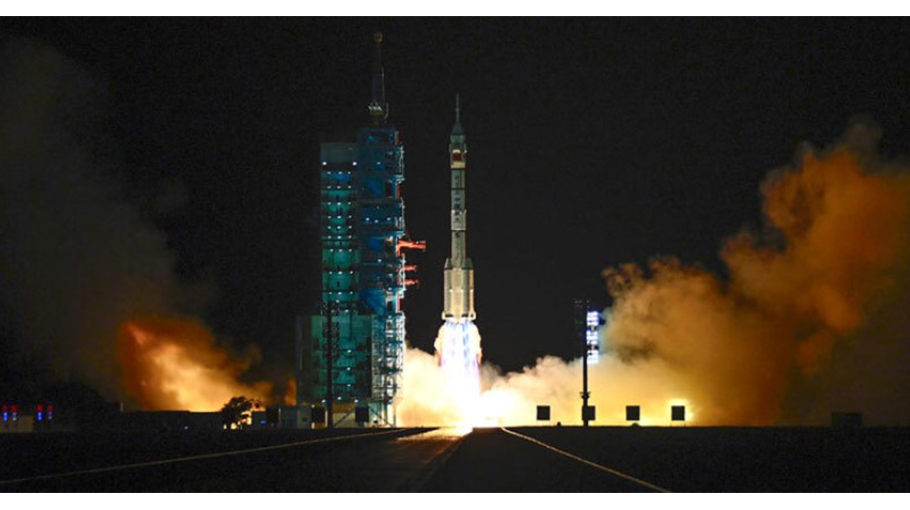China declares success as its youngest astronauts reach space

A Chinese spacecraft with a three-person crew, including the country's first female space engineer, has docked after a journey of more than six hours.
The crew will use the homegrown space station as a base for six months to conduct experiments and carry out spacewalks as Beijing gathers experience and intelligence for its eventual mission to put someone on the Moon by 2030.
Beijing declared the launch of Shenzhou 19 a "complete success" - it is one of 100 launches China has planned in a record year of space exploration as it tries to outdo its rival, the United States.
The BBC was given rare access to the Jiuquan Satellite launch centre in Gansu and we were just over a kilometre away when the spacecraft blasted off.
Flames shot out of the rocket launcher as it took to the skies, lighting up the Gobi Desert with a deafening roar.
Hundreds of people lined the streets, waving and cheering the names of the taikonauts, China’s word for astronauts, as they were sent off.
At the Tiangong space station, the Shenzhou 19 crew met with three other astronauts who are manning the Shenzhou 18 and will return to Earth on 4 November.
Just two years ago, President Xi Jinping declared that "to explore the vast cosmos, develop the space industry and build China into a space power is our eternal dream”.
But some in Washington see the country’s ambition and fast-paced progress as a real threat.
Earlier this year, Nasa chief Bill Nelson said the US and China were “in effect, in a race” to return to the Moon, where he fears Beijing wants to stake territorial claims.
He told legislators that he believed their civilian space programme was also a military programme.
'Dreams that spark glory'
However, in Dongfeng Space City, a town built to support the launch site, China’s space programme is celebrated.
Every street light is adorned with the national flag.
Cartoon-like astronaut figurines and sculptures sit in the centre of children’s parks and plastic rockets are a centrepiece on most traffic roundabouts.
A huge poster with Xi Jinping on one side and a photo of the Shenzhou spacecraft on the other greets you as you drive into the main compound.
Hundreds have gathered in the dark after midnight to wave flags and brightly coloured lights as the Taikonauts make their last few steps on Earth before heading to the launch site.
The brass band strikes up Ode to the Motherland as young children, kept up late for the occasion, their cheeks adorned with the Chinese flag, all shout in full song.
This is a moment of national pride.
The pilot of this mission, Cai Xuzhe, is a veteran but he’s travelling with a new generation of Chinese-trained taikonauts born in 1990 – including China’s first female space engineer, Wang Haoze.
“Their youthful energy has made me feel younger and even more confident,” he told the gathered media ahead of take-off.
“Inspired by dreams that spark glory, and by glory that ignites new dreams, we assure the party and the people that we will stay true to our mission, with our hearts and minds fully devoted. We will strive to achieve new accomplishments in China’s crewed space programme.”
Standing to his left, beaming, is Song Lingdong.
He recalls watching one of China’s first space station missions as a 13-year-old with “excitement and awe”. He chose to become a pilot in the hope that this is how he could serve his country.
All three convey their deep sense of national pride, and state media has emphasised that this will be its “youngest crew” to date.
The message is clear: this is a new generation of space travellers and an investment in the country’s future.
China has already selected its next group of astronauts and they will train for potential lunar missions as well as to crew the space station.
“I am determined not to let down the trust placed in me,” says Mr Song. “I will strive to make our country’s name shine once again in space.”
Astronauts (L-R) Wang Haoze, Song Lingdong and Cai Xuzhe wave before the launch
China’s name has been "shining brightly" a lot lately when it comes to headlines about its space programme.
Earlier this year, the country achieved a historic first by retrieving rock and soil samples from the far side of the Moon.
In 2021, China safely landed a spacecraft on Mars and released its Zhurong rover – becoming just the second nation to do so.
China also has a fleet of satellites in space and has plans for many more.
In August it launched the first 18 of what it hopes will eventually be a constellation of 14,000 satellites providing broadband internet coverage from space, which it hopes will one-day rival SpaceX’s Starlink.
Elon Musk, Starlink's chief executive, admitted on his own platform X that China’s space programme is far more advanced than people realise.
But others in the US are voicing even greater concerns, as they fear this technology can be weaponised.
The head of US Space Command, General Stephen Whiting, told a space symposium in April that China and Russia were both investing heavily in space at a “breath-taking speed”.
He claimed that since 2018, China has tripled the amount of intelligence, surveillance and reconnaissance satellites it has in orbit, building a “kill web over the Pacific Ocean to find, fix, track and target United States and allied military capabilities”.




